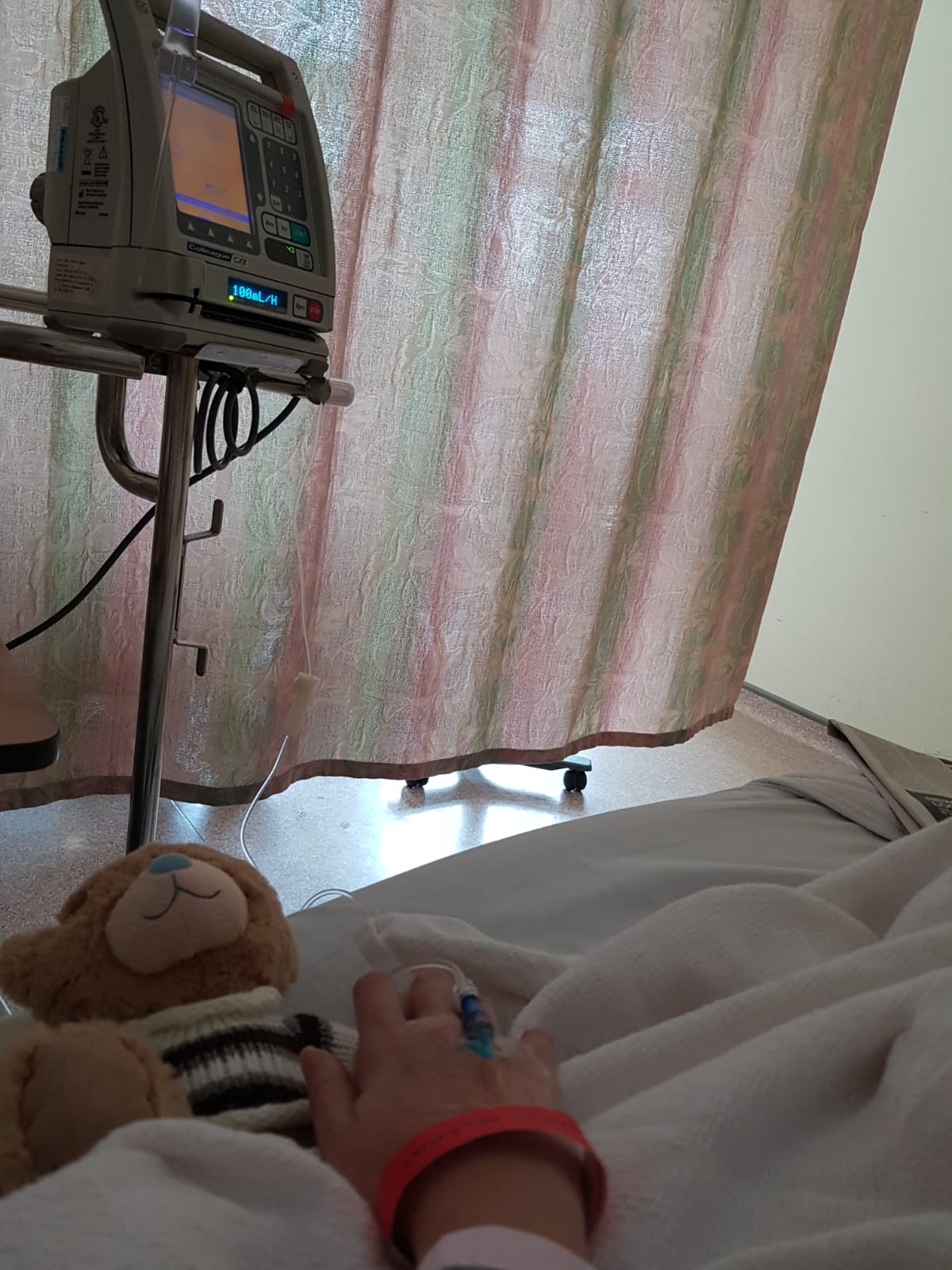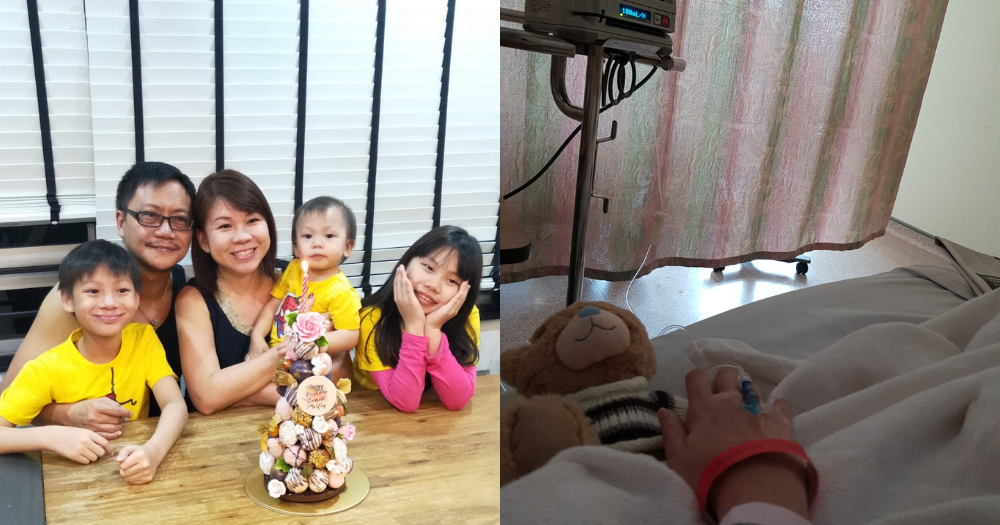When I met 41-year-old Shannon Heo at a coffeehouse in a neighbourhood shopping mall, it felt like I was meeting an old friend.
With her bubbly personality and infectious laughter, it didn't take us long to be acquainted, especially since we share a love for animals -- a love that is almost second nature to Heo, since she's a veterinarian by profession.
I also noticed that she was carrying a bag full of books. Specifically, children's books.
"I'm going to return these books to the library later, my kids have been bugging me to do it so they can redeem some collectible cards."
Apart from being a doting mother, a passionate vet and an overall likeable human being, there's something that sets Heo apart from a lot of us -- she has been battling multiple sclerosis (MS) since 2010.
 Celebrating her birthday with her family, a month after she suffered from a relapse. Photo courtesy of Shannon Heo.
Celebrating her birthday with her family, a month after she suffered from a relapse. Photo courtesy of Shannon Heo.
What's multiple sclerosis?
For those who are unfamiliar with the term, MS is a disabling disease that affects the central nervous system and thus disrupting the flow of information between the brain and the body.
It is commonly known as "snowflake disease", as the symptoms vary from person to person.
For American actress Selma Blair who was also diagnosed with MS, she has experienced speech impediments and walking difficulties.
Besides these, common physical symptoms include double vision, blindness in one eye, muscle weakness, trouble with sensation, or trouble with coordination.
Heo, on the other hand, has faced other symptoms that seemed menial at first, but almost cost her life.
Almost got into accident
Back then, Heo thought that she was just a "very, very clumsy" person as she would constantly lose her balance and, for some reason, couldn't stand up straight.
But she knew something was wrong when she almost got herself into a traffic accident.
Heo was driving her car down a slope, thinking the road was clear.
Suddenly, she noticed a car approaching her hot and fast, causing her to swerve a little.
"When I realised my depth-spatial awareness was skewed, I knew it wasn't because I was clumsy anymore."
Misdiagnosed with cancer
After the near-death experience, Heo decided to visit a neurologist.
Even after a neurological examination, her doctor couldn't determine a diagnosis but mentioned that "something wasn't right" and referred her to a neuroradiologist instead.
A neuroradiologist is a doctor that is trained in the field of radiology and focuses on diagnosing conditions of the spine, neck, head, and central nervous system.
The neuroradiologist made her go through further tests, including a magnetic resonance imaging (MRI) scan and greeted her with bad news.
"He said my brain looked really bad and suspected that I had a malignant lymphoma."
In case you didn't know, lymphoma is a type of cancer that begins from the lymphocytes, which are white blood cells that help to fight infections.
Heo's father, who accompanied her to the hospital, was upset upon hearing her initial diagnosis.
But Heo wasn't exactly convinced.
With a medical background herself, she doubted the diagnosis and decided to get a second opinion.
"If I truly had brain lymphoma, I figured that my symptoms would be worse. They wanted to do a biopsy on me, but I wasn't going to let them cut my head open!"
After further tests and more MRI scans and lumbar punctures with another neurologist, she was finally correctly diagnosed with multiple sclerosis (MS) -- a diagnosis that brought her relief, albeit briefly.
"I was relieved at first because it's not cancer, it's not like I was going to die. But I started reading up about MS and the implications, it was hard to accept."
Oral drug costs S$5,000 a month
Despite knowing the gravity of the condition, Heo didn't want to go on medication.
One of the treatments she was initially offered was a set of self-injectable medications that patients would have to give themselves a few times a day, much like insulin shots for diabetes.
"I just couldn't accept the fact that I have to inject myself for the rest of my life, so I couldn't do it."
But the routine wasn't the only thing that deterred Heo from seeking treatment.
The medical costs for MS are generally expensive as they are not subsidised drugs.
The injectables, for example, would have set Heo back by about S$2,000 a month.
Another daily oral drug that Heo was introduced to, on the other hand, costs between S$5,000 to S$6,000 a month.
Frightening experience for kids
Heo went on without medication for close to nine years until she suffered a relapse in January 2019.
Her relapse, which she believes was caused by the stress she suffered after the demise of her dog, had caused half her body to be paralysed.
 Heo having her IV transfusion in a hospital following her latest relapse in January 2019. Photo courtesy of Shannon Heo.
Heo having her IV transfusion in a hospital following her latest relapse in January 2019. Photo courtesy of Shannon Heo.
That was the first time her children, aged between two to 11 years old, had seen her on the hospital bed.
"My eldest son, he was frightened and asked me if I was going to die. I explained to him: 'No, but my mobility is affected so I don't know if I can play basketball with you or if I can run again next time.'"
That relapse was also when the doctor strongly encouraged her to get treated and suggested Mavanclad, a disease-modifying drug.
According to her, she was told that she only has to take a total of 20 pills over the course of two years.
"I was so excited, I immediately said: 'Yay, let's go for it!'"
Alas, she's still considering this option as each pill costs S$5,000, coming to a grand total of S$100,000 for the entire treatment.
Family is important
But while she's ruminating on the pills, Heo's husband (whom she calls her soulmate) has been encouraging her to take on any treatment, regardless of the cost.
He told her:
"Whatever it takes, just go for it. Your life is more important than money."
Apart from her husband and young children, her extended family have also been her biggest pillars of strength.
In fact, Heo and her family moved to Choa Chu Kang after her diagnosis, so that she could live closer to her parents' place.
"I cannot go on like this anymore"
Besides the above-mentioned physical symptoms, people with MS are also more likely to experience mental health issues like depression or anxiety.
Unfortunately, even the high-spirited Heo isn't spared.
With a sigh, Heo said that she has had months where she felt like that's the end for her.
"People always think I'm strong enough, so when I tell them I'm not ok sometimes they don't believe me. I've even went to my neurologist and told him that I cannot go on like this anymore."
But Heo is thankful to have the support of her family, friends, and neurologist.
"He (neurologist) said that I'm strong enough and my friends would tell me that I won't let myself die because I'm too stubborn and have too much to live for... which is true."
Invisible illness
As MS is also known to be an invisible illness (a term used for medical conditions that aren't easily visible to others), Heo has heard her fair share of unwarranted comments.
"People have told me "you don't look sick what". I may look like I can walk, but I feel like I can fall down anytime. It's an invisible condition, a lot of us suffer in silence."
And then there were some others who were well-intentioned but ignorant of MS:
"Someone told me to do hot yoga but MS patients are heat intolerable, you see. Our symptoms can get worse."
Despite all of that, Heo doesn't get frustrated or angry at the comments.
Instead, she uses such opportunities to correct and educate them.
"There's a stigma to MS and I'm trying to get rid of it by raising awareness about it so people can stop making insensitive comments and start treating us properly."
Run for MS
And one way she has raised awareness is by becoming part of Run for MS, a Facebook page and group of runners that not only aim to educate people about MS but also to raise funds for the MS Assistance Fund.
It started in 2012 when Heo chanced upon a Facebook post from the Singapore Cancer Society, in a bid to get people to join them for a fundraising marathon.
Full disclosure: Heo never enjoyed running prior to this, but signed up for it anyway.
"I lost my ability to walk or run momentarily when I had my first relapse. But now that I regained my ability again, why not put it to good use?"
 Heo (third from left) with other runners at their very first charity run in 2015. Photo courtesy of Shannon Heo.
Heo (third from left) with other runners at their very first charity run in 2015. Photo courtesy of Shannon Heo.
Soon, she branched out to raise funds for other charities and eventually began running to raise funds for other MS patients who cannot afford treatment.
And the efforts of Heo and other marathon runners didn't go to waste as they have raised a total of S$27,946 back in 2017.
Trying to live normally
As a strong-willed woman, Heo tries not to stray away from her routine pre-MS, as she believes that the more she thinks about her condition, the more things are going to happen.
"I don't base my decisions on my condition. For as long as I am able to, I will continue living as I usually would."
But she did have to make some small changes when it came to her veterinary career.
This is because another symptom that Heo has is brain fog -- a cognitive dysfunction that involves memory problems.
Therefore, she requires more time to carry out tasks that require a higher level of cognitive processing.
"In the scientific field, I have to do a lot of heavy reading with cheem journal articles and textbooks. So on days when I get a brain fog, it's hard to get things in my head instantly."
And despite being at her current workplace for more than 10 years and having relatively close friendships with most of her colleagues, she fears that she's troubling them and worries about being a burden.
"I don't want them to think that I'm passing on my workload to them."
MS is not a death sentence
Ultimately, MS is like a gamble to Heo because of how unpredictable the disease is.
"I might be the lucky one where my condition doesn't progress, but if it does then I may have to consider treatment seriously. Either way, I'm going to take the gamble. Who knows, I might win full house?"
Just like how she's not letting MS be an excuse for her to slow down in life, she hopes other MS patients will be encouraged to do the same too.
"Try to stay fit and believe that there are ways to help yourselves, MS is not a death sentence."
If you like what you read, follow us on Facebook, Instagram, Twitter and Telegram to get the latest updates.
